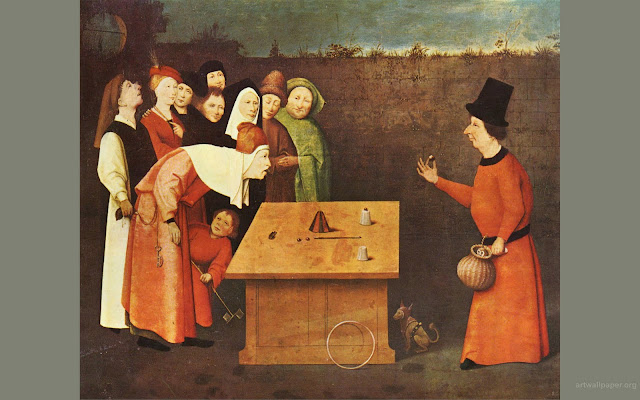I can't remember even a split second out of 65 years when I believed that some Supreme Being ruled us, watched us, created us, or whatever. I haven't lapsed, the idea never even dawned on me, and it certainly never convinced me whenever other people suggested it as an explanation for our existence.
On the other hand, I find the world wonderful, magical, intriguing, baffling and delightful at times, although occasionally I have felt glimpses of horror. Mostly at what humans appear capable of. They have never taken the form of 'glimpses of the abyss' however. I don't seem to mind nothingness. If I had to choose a label for myself it would probably resemble pantheist rather than atheist.
Mystical experiences of nature in my childhood, spending time outside with nature on acid, mushrooms and other fabulous life enhancers, deep philosophical thought about what we mean by consciousness, all have contributed to my sensation of a great living mystery, a whole system, not an empty and meaningless universe.
And yet it has never appeared to need an external creator. VALIS, Tao, call it what you will, it remains the unimaginable, the Unknown, a mystery. If I had to use the word 'God' to indicate anything I would use it to point to that vastness, that infinitesimal, paradoxical zone...about which nothing can usefully be said.
Hardly an image of a Godhead that we might come to know as a being of any kind. Whether as a friend, or as a tyrant.
I guess that the perception of this scale of things first came to me through my father, who had belonged to the Theosophical movement, which, for all its faults, sought the root of all religions and religious feelings...looking for the fundamentals, and the things they all had in common. It exemplified a view more in harmony with Hindu and Buddhist world-views, rather than the curious, local model of the Judaeo-Christian- Muslim spectrum.
The Gnostics attracted me when I came across them. I don't study religions looking for some ultimate truth, though. Just as Richard Wiseman can write about Paranormality, and study it even though he has never uncovered any totally convincing evidence to support such a view of the world. What he finds interesting is why humans appear to need these kind of beliefs, or how they appear and become self-sustaining. I have the same feeling about 'religions'. At least the Gnostics (for all their strange imagery and approachs) indicated that the ground of being was ultimately unknowable, and indescribable. I tend to align with a third-generation atheist like Kurt Vonnegut, who also found people's passion for exotic belief systems intriguing. I guess that makes me a member of the Church of God the Utterly Indifferent (from The Sirens of Titan).
I don't intend to expand on the various influences on my own practice, although I still recommend the delightful Alan Watts to anyone who wishes to explore these things with a friendly guide.

And if anyone wants the best meditation 'trick' I know, then I recommend D.E.Harding's "On Having No Head - a contribution to Zen in the West" - which is a brief and amusing book, and offers a deceptively simple exercise which may lead you to great insights. Nothing to remember, no difficult yoga, no memorising of elaborate symbol systems, nothing like that at all, at all.
And if you prefer something a little more linear, his little book on religions of the world is currently on sale for a mere £3...











